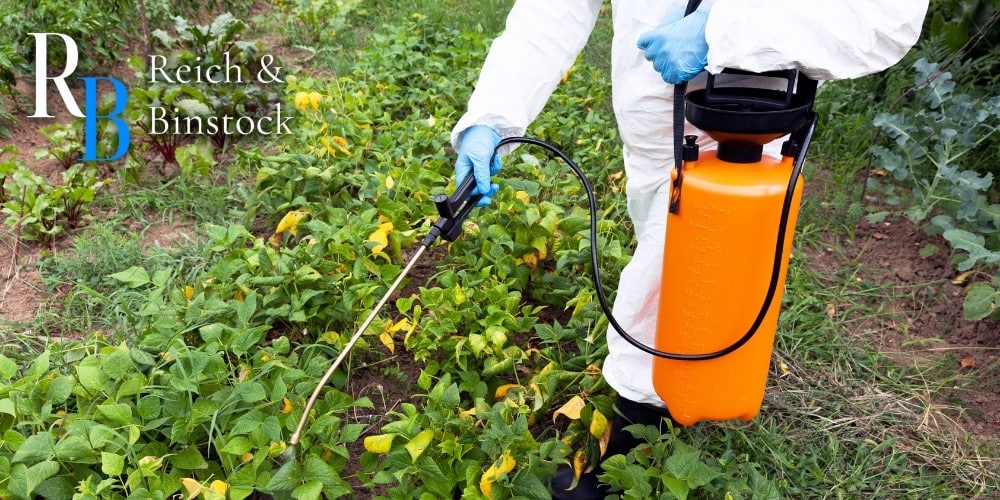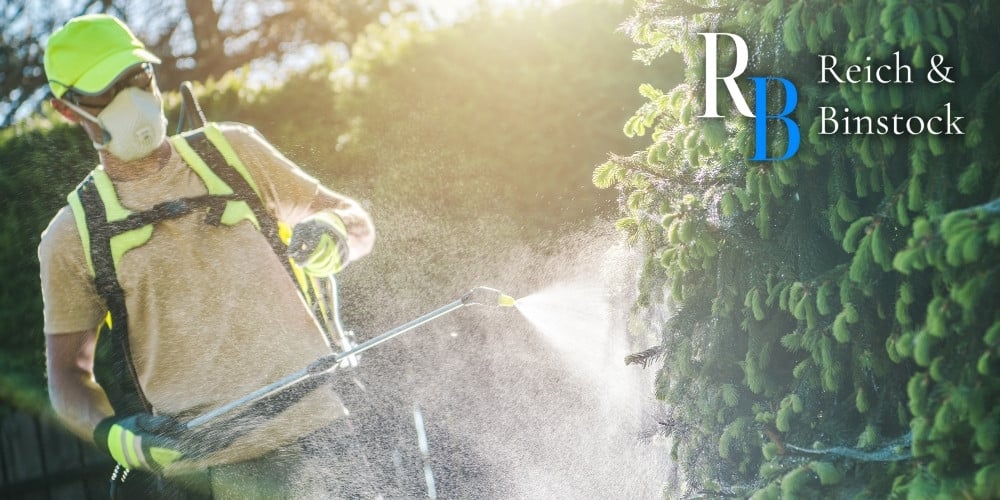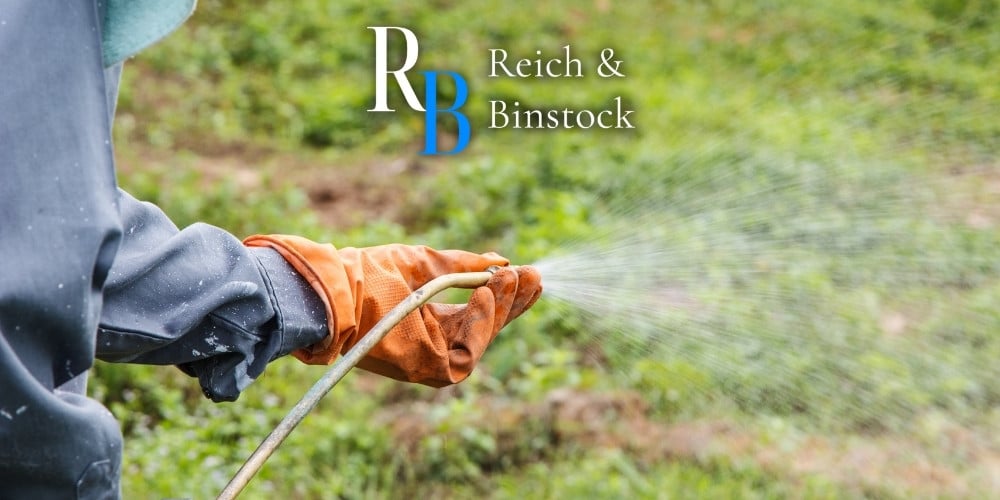Paraquat dichloride is a popular herbicide, or weed killer, that has seen widespread use in the United States since the 1950s. Although it is effective as a weed killer, paraquat’s toxicity poses significant health risks to those exposed. Handlers of the paraquat herbicide must undergo training on how to do so safely. This is largely because of the known adverse health effects, as well as its fatality if ingested. Currently, there are more than 1700 paraquat lawsuits included in the multidistrict litigation case. In this blog, our paraquat lawyers outline the paraquat lawsuit update for November 2022.
At Reich & Binstock, our nationally recognized trial lawyers have extensive experience handling MDL and toxic exposure cases. We are seasoned mass tort attorneys with the skills and knowledge you need for a better chance at a favorable outcome in your case. If you or your family member has suffered adverse health effects or developed Parkinson’s disease after paraquat exposure, you may be entitled to significant compensation. To schedule a free consultation with our law firm, please call us at 713-622-7271 or fill out our online intake form today.
Paraquat Lawsuit Update November 2022
The latest update concerns the paraquat MDL bellwether trials. A bellwether trial basically serves as a test trial that will give defendants and plaintiffs an idea of how future trials may play out. The first bellwether trial is set to occur on November 15, 2022. Other trials will follow in March, June, and September of 2023. Keep in mind that this is only the opening round of bellwether trials, which means that more may follow.
What Is Paraquat?

According to the CDC, paraquat is a “toxic chemical that is widely used as an herbicide, primarily for weed and grass control.” The most common form of the chemical that is available in the United States is in liquid form. It comes in different strengths, and is classified by the EPA (Environmental Protection Agency) as a “restricted use” product. This means that only licensed applicators may use the product.
Again, the herbicide paraquat is highly toxic and is often fatal when ingested. There is no cure for paraquat poisoning. In order to make the product safer to use, the version of paraquat that is sold in the United States has certain safeguards. These safeguards are as follows.
- Blue dye to prevent confusion between paraquat and other beverages
- A sharp odor to warn people of its toxicity
- An added chemical that will induce vomiting if ingested
Paraquat marketed outside of the United States may not have these safeguards in place. For this reason, one should never order this chemical from a foreign supplier. It’s also important to know what products contain Paraquat so that you can have a better understanding of whether or not you were exposed.
How Does Paraquat Work?
Paraquat dichloride works by aggressively locking onto plants, acting quickly, and remaining even during and after it rains. The specific process that paraquat uses is called a “redox” reaction. Redox is a shortened term for oxidation and reduction. Paraquat is a strong acceptor of electrons, and it directly interferes with the process of photosynthesis in plants. Photosynthesis is essential for plant life.
The chemical also attacks the essential fatty acids in the plant cell membranes, which in turn causes rapid desiccation (extreme drying) of the plant. This causes the entire plant to die very quickly. When ingested in animals and people, it very quickly affects the respiratory system, as well as other crucial organs.
Is Paraquat Banned in the United States?
No. However, it is a “restricted use” chemical, meaning that one must have training and a commercial license in order to use the product. Certified applicators must have undergone EPA training in order to use the chemical compound. Across the globe, paraquat is still one of the most commonly used herbicides.
Where Is Paraquat Banned?
Currently, the entire European Union, which consists of 27 countries, has banned the use of paraquat. The ban went into effect in 2007 after shocking research surfaced that linked paraquat exposure to developing Parkinson’s disease. Switzerland banned paraquat even earlier, in 1989. China has also banned the use of paraquat. This is ironic, as the company that produces paraquat, Syngenta, is headquartered in Switzerland and owned by China.
Despite its widespread ban in Europe, the United States continues to manufacture and sell paraquat under the brand name Gramoxone. Gramoxone is made and sold by Chevron USA. Other products and brand names contain paraquat as an ingredient as well.
Despite its toxicity, paraquat is still used on more than 50 crops in 120 countries around the world today.
Why Are Paraquat Lawsuits Being Filed?

The ongoing paraquat lawsuits aim to seek justice and compensation for those who were directly or indirectly exposed to paraquat and who developed Parkinson’s disease or other negative health effects as a result. Hundreds, possibly thousands of farmworkers and agricultural workers have pursued paraquat cases. The paraquat litigation alleges that their paraquat exposure led to the plaintiffs developing Parkinson’s disease. Many other paraquat exposure lawsuit claims include links to certain types of cancer, as well as other health problems.
The paraquat Parkinson’s disease lawsuits are the most significant, and they have the most extensive research attached to them. If you or someone you love developed Parkinson’s disease as a result of chronic paraquat exposure, you may be entitled to compensation. Contact a paraquat lawyer with our office to learn more about your options.
Is the Paraquat Lawsuit a Class Action or a Mass Tort Lawsuit?
The new paraquat lawsuits are not part of a class action lawsuit. Rather, each paraquat Parkinson’s disease lawsuit is a part of another form of mass tort case called multidistrict litigation. The difference between how a paraquat class action lawsuit and the paraquat MDL are handled lies in how the potential settlements are treated.
In a class action lawsuit, many people consolidate their paraquat lawsuits in order to speed up the process and reach a settlement more quickly. However, in the event of a class action paraquat lawsuit settlement, all the plaintiffs split the compensation equally.
Paraquat cases in an MDL, however, are still treated as individual cases when it comes to settlement compensation. The paraquat litigation is still consolidated in order to expedite the process and preserve the resources of the federal court system. Each individual lawsuit remains its own case, as do the paraquat lawsuit settlements.
In an MDL, the defendants and the plaintiffs will negotiate what is called a global settlement. The global settlement will cover hundreds or even thousands of lawsuits. Based on the facts and circumstances of each individual lawsuit, paraquat plaintiffs will receive a certain portion of the settlement.
How Promising Is the Paraquat Lawsuit?
At Reich & Binstock, our paraquat attorneys believe the potential payout for an individual Parkinson’s disease paraquat lawsuit to be very promising. This is largely due to comparisons between the Roundup lawsuits and the paraquat exposure lawsuits. Monsanto, the maker of Roundup, has currently settled more than 100,000 lawsuits, with thousands more pending. Comparatively, there are only around 1700 active paraquat lawsuits. This means that an individual’s payout from a paraquat Parkinson’s lawsuit has the potential to be even larger than those in the Roundup lawsuits.
Each Roundup lawsuit is different, but the average payouts range between $5,000 and $250,000. Currently, we have no way of knowing what the average settlement payouts will be for paraquat cases. However, the results from the bellwether trial cases will greatly affect the outcomes of future cases. The following factors also have the potential to affect the potential payouts.
- The strength of the evidence that links paraquat and Parkinson’s disease
- Evidence in each individual paraquat case
- The final number of lawsuits filed in the paraquat MDL
Who Was Exposed to Paraquat Poisoning?

You may be unsure of whether or not you were exposed to the toxic chemical paraquat. Not only is paraquat its own product, but there are other paraquat products that simply contain the chemical. In other words, it may be combined with other chemicals in professional-strength herbicides. Those who work in landscaping, agriculture, or those who are licensed applicators are at a much higher risk of being exposed to paraquat than the general public. You may have even been exposed without knowing it.
Occupational exposure is the most common way people are exposed to paraquat. However, one can experience paraquat poisoning after ingesting anything that was exposed to paraquat. You can even suffer adverse effects via inhalation or skin exposure. Licensed applicators are required to wear masks and protective clothing in order to reduce the risk of exposure.
If you have been around paraquat in your lifetime, we recommend examining the following indicators of paraquat exposure. Compare these indicators with your own life and determine whether or not there is a chance you have been exposed.
- Characteristics of paraquat as a chemical: As we mentioned previously, paraquat has a distinct blue color and a pungent odor. If you recall working with herbicides that had the same characteristics, it is likely that you worked with paraquat. Recall whether or not you wore protective gear during your paraquat use.
- Suffering from the symptoms of paraquat exposure: There are several obvious physical symptoms of paraquat exposure. If you experienced any of these symptoms, there is a fair chance that you endured exposure to paraquat.
- High levels of exposure can lead to even more serious symptoms: Ingesting large amounts can produce severe symptoms, such as organ failure and other life-threatening conditions.
Side Effects of Paraquat
The side effects of paraquat exposure are usually very severe. Paraquat poisoning has very distinct symptoms, but experiencing those symptoms does not automatically mean you have paraquat poisoning. If ingested or absorbed into the body, paraquat quickly causes toxic chemical reactions that can cause serious illness or even death. Below, we list some of the most notable symptoms of paraquat poisoning.
- Lung scarring
- Internal bleeding
- Difficulty breathing
- Organ failure
- Cardiogenic shock, which is when the heart cannot pump enough blood to the rest of the body
- Ulcers in the mouth and tongue
- Cell and tissue death
- Blood clots
- Collapsed lungs
- Dehydration
- Low blood pressure
- Kidney or liver failure
- Lung cysts
- Imbalance of mineral salts
Many of the first signs of paraquat toxic exposure affect the digestive system. Example symptoms include mouth and throat pain, vomiting, stomach pain and cramping, swelling of the mouth and throat, and bloody diarrhea.
Paraquat and Parkinson’s Disease
Many members of the scientific community concur that there is a link between Parkinson’s disease and exposure to paraquat. One study from the National Institutes of Health provides particularly strong evidence for the tendency of farmers who use paraquat to develop Parkinson’s disease.
Over the past twenty years, extensive research has demonstrated a significant link between Parkinson’s disease and paraquat. This research also shows an increase in the risk of developing Parkinson’s disease for those who live near places where paraquat is used.
Importantly, not every person who endured exposure to paraquat develops Parkinson’s disease as a result. However, paraquat can lead to cell death in humans. Parkinson’s commonly arises from the death of certain neuron cells in the brain. These particular neurons could be more vulnerable to oxidative stress, which is how paraquat kills cells.
Those with a genetic predisposition for Parkinson’s may be even more at risk if exposed to paraquat. A small percentage of Parkinson’s cases are genetic, but genetics and environmental exposure can combine to create an increased risk in certain people.
What Are the Projected Paraquat Settlement Amounts?
As with many MDL cases, the conclusion of the paraquat trial will divide all the plaintiffs’ cases into “tiers” of compensation. Each tier provides an estimated high and low end of settlement amounts if the lawsuits are successful. Tier 1 plaintiffs generally experience very severe symptoms from Parkinson’s disease and other health problems. Their treatment costs are often very high, which increases how large their settlement could be.
Tier 2 settlements are for victims who suffered moderate damages. Their damages are more moderate, and they experienced less serious symptoms. Tier 3 settlements are for victims with lesser damages. Keep in mind that any paraquat settlement estimates that you see online may not be entirely accurate at the moment.
The outcomes of the bellwether test trials are likely to have a significant impact on the potential settlement amounts. To learn more about the potential value of your claim, we recommend speaking with an experienced paraquat attorney.
How Long Will It Take to Settle the Paraquat Lawsuit?

Unfortunately, it is difficult to predict how long it may be before these cases are settled in the federal courts. Paraquat lawsuits involving Parkinson’s first picked up traction in 2017. As of right now, five years have passed since those lawsuits came about. The number of these lawsuits is still increasing, and many cases are still pending. This makes it difficult to determine how much time will pass before the first settlement payout occurs.
In order to provide any kind of time estimate for your case, we will need to look at the facts and circumstances surrounding it. We can use past lawsuits and MDL cases as a baseline for establishing our estimate. Keep in mind that mass torts can take several years to fully resolve, as the discovery process alone often takes well over a year. Discovery can include multiple steps, including depositions, interrogatories, and request for production.
Are You Eligible for the Paraquat Lawsuit?
If you suspect you have suffered from paraquat exposure, you may wonder about your eligibility. We strongly recommend scheduling a free consultation with a personal injury lawyer with experience in mass torts for your paraquat case. Our attorneys have closely followed all of the paraquat lawsuit updates, and we can help you determine whether or not you are eligible to file a claim. Below, we outline the general criteria that one must meet in order to file a paraquat lawsuit.
- You or your family members were exposed to paraquat due to their occupation or due to their home’s proximity to a farm that uses paraquat. Take note of the following details.
- When the exposure occurred
- When the Parkinson’s diagnosis occurred
- Provide documentation of the Parkinson’s diagnosis, as well as the associated medical treatments.
- Provide documentation of other important factors, such as lost wages, loss of earning capacity, and other damages.
This is not an exhaustive list of what you must prove to file a claim. The easiest way to determine your eligibility is to contact a paraquat attorney with Reich & Binstock. We will evaluate the facts of your case during your free, no-obligation consultation and let you know whether or not you qualify.
Contact a Paraquat Lawsuit Attorney Today
At Reich & Binstock, we take great pride in our recognition as national trial lawyers. We have taken part in many mass tort cases, class action lawsuits, and other groundbreaking litigation. If you or your family members were exposed to paraquat and developed Parkinson’s, you may be entitled to compensation. To schedule your free case evaluation with us, please call our office at 713-622-7271 or fill out our online intake form today.













